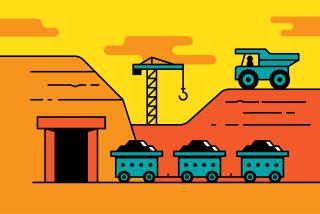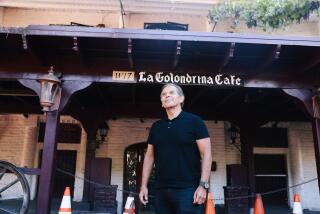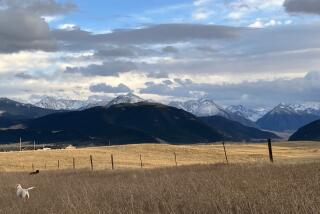Life With Age-Old Problems
YOUNGTOWN, Ariz. — Life was lovely in Youngtown, they say, before the young people came.
They know it’s not charitable to say such a thing. They lower their voices when they say it. But back in the old days there were canasta games and potluck suppers, and no one had a basketball hoop or a boombox, and everyone felt safe gliding along in their golf carts at five miles an hour.
Now, that serene idyll, that quintessentially American dream of community and exclusivity, has gone to heck.
It’s not that the older people dislike the young people in Youngtown. They just don’t want them here. They came here to get away from young people, because the name -- Youngtown -- wasn’t meant to be a joke, but a hope. The fountain of youth was supposed to bubble here, without young people to poison the well.
In 1954, they began flocking to this strip of desert, 18 miles northwest of Phoenix, from places like Pittsburgh and Grand Rapids, to escape winter, of course, but also congestion, crime, noise and all the chaos they associate with youth. Especially noise. After a lifetime of blaring stereos and bleating car horns and rumbling mufflers and shrieking infants and shuddering Harley-Davidsons, they wanted to age not just gracefully but also peacefully.
Youngtown seemed the place. Billed as the first-ever retirement community in the United States, home of AARP Chapter 1, the town was founded by a hardy band of pioneer seniors. Legendary TV newsman Dave Garroway depicted it as a retiree utopia, with modest, two-bedroom ranch houses that no one younger than 55 was allowed to buy, and where everyone knew the lyrics to “Let Me Call You Sweetheart.”
Lately, however, older residents don’t feel much like singing. Five years after Arizona’s attorney general stripped Youngtown of its status as a retirement community -- saying the town founders had failed to establish a legal charter barring young people -- the average age is plummeting and the crime rate is soaring. Domestic violence is up, along with burglary and assault, and someone even fired a sawed-off shotgun at a Youngtown police officer the other day.
In the years since the attorney general stepped in, Youngtown’s population has grown by a third, to nearly 4,000, and all the newcomers are young families, with young children, young demands -- and age-old problems.
Youngtown Police Chief Dan Connelly says for decades his department merely baby-sat the town. “We’d get [911] calls from a lady who couldn’t figure out how to work her thermostat after her husband had passed away,” he says.
Now the calls are about prowlers and drug dens and rape.
“We’ve had shootings, stabbings, officers assaulted,” Connelly says, reviewing just the last month’s police log. “Sexual misconduct with minors. We just had two cases reported the same day last week, 10 cases this year.”
The 61-year-old chief himself came to Youngtown in search of calm. “I wanted to spend the last 10 years of my career in a nice, quiet community,” he says, frowning. “So much for that idea.”
Before young people, there was only one accepted intruder in Youngtown -- death. The surest indicator that Youngtown is growing younger, Connelly says, is the number of calls about dead bodies. Youngtown police used to log 30 such calls per year. So far this year, it’s only six.
For many older residents the latest indignity, and the most startling step in the town’s reverse aging process, came in May, when Youngtown elected its first mayor, a local restaurateur born after the Korean War. Bryan Hackbarth, a 41-year-old father of two young children, benefited from the town’s shifting demographics by garnering 184 votes, two more than his opponent, Daphne Green, who gives her age as “mid-70s.”
When Hackbarth moved here several years ago, it was customary for the Town Council to choose the mayor, and few people showed up for the meetings. He and other newcomers pressed for a general mayoral election, to bring young people into the political process. “It’s just the changing times,” says former Mayor Green. “And I think other retirement towns better be careful.”
Green moved to Youngtown with her husband in the 1970s, intending to spend the rest of her life in homogeneous harmony with others her age. That plan, she says, has now been steamrolled by skateboards and strollers.
“I love children,” she says, “but children are children -- let’s just put it that way. The main problem is when you get a little woman 85 or 90 years old and a 2-year-old moves next door and kids throw oranges at her. It is a torment.”
When Trouble Starts
Few foresaw such torment in 1998, when Youngtown discovered a local retired couple breaking the rules by letting their 17-year-old grandson, who wasn’t getting along with his parents, live with them.
No young people in Youngtown, officials reminded the couple. The grandson must go.
An open-and-shut case, it seemed. But the couple countered by suing Youngtown. Lawyers descended, sides were chosen and Youngtown became the scene of a landmark generational battle.
Arizona’s attorney general at the time was Grant Woods, a 44-year-old civil rights activist who saw the dispute as simple discrimination. He declared that retirement communities are fine, in principle, but that Youngtown’s founders hadn’t followed clearly defined legal procedures in drafting their charter back in the 1950s. The town’s claim as a retirement community, he found, was belated, and therefore invalid, and so all attempts to evict the teenager amounted to harassment.
“They tried to unilaterally and retroactively make Youngtown a senior community without the consent of all the residents,” says Woods, now a trial lawyer in Phoenix. “They tried to just say, ‘We want it to be this way -- so it is.’”
That was Youngtown’s “legal mistake,” Woods says, “but the big mistake they made was just not being compassionate in a situation that called for compassion. Rather than trying to flex their muscles about this particular issue, I think if they would’ve showed [the grandson] compassion, then the whole thing wouldn’t have come up.”
Youngtown officials still insist that Woods was wrong, that their town charter was fine. But they say they didn’t have the money to fight him in court, so they were forced to stand by and watch in horror as Youngtown suddenly shed gray faster than a model for Grecian Formula. Deed restrictions were relaxed, and houses were sold for the first time to buyers in their 40s and 30s -- even 20s.
As older residents fled the coming deluge, their exodus pushed the floodgates open that much wider. They were almost always replaced by young people, who were attracted to Youngtown’s affordability. Many young families jumped at the chance to buy a desert home for $75,000, four times less than it would cost in, say, nearby Scottsdale.
Woods says he sympathizes with Youngtown’s older residents. He acknowledges that they believed Youngtown was a sanctuary and moved here in good faith. But he had no choice under the law, he says -- he had to defend the grandson’s constitutional rights.
Still, he adds, “there was one place I fell down in the profiles of courage. They had a Town Council meeting and I sent my civil rights chief in my place. I was afraid of a drive-by golf cart shooting.”
At Mayor Hackbarth’s first Town Council meeting last month, he set the tone for the new Youngtown, and for his new administration, by arriving on a Harley, which he weaved in and out of the golf carts and Cadillacs parked outside Town Hall. He didn’t pop a wheelie, but he did make sure to gun the engine when he noticed older residents staring.
“It was a statement to be made,” he says the next morning, smiling and rocking back and forth in his chair at Town Hall.
After putting down the Harley’s kickstand, Hackbarth threw down the gauntlet. He read a speech in which he quoted the Gettysburg Address, reminding the fourscore white-haired and gray-haired (and a few dark-haired) residents on hand that “government of the people, by the people, for the people, shall not perish from the earth.”
In a room where many were wearing hearing aids, Hackbarth’s message came through loud and clear. The “people” in Youngtown are young and old now.
Youngtown’s old guard did everything possible to block Hackbarth’s election, he says, because they vehemently opposed his campaign pledge to spend town money on things for young people, like parks and playgrounds. They smeared him and spread rumors, he says, and even circulated damning documents from his past.
“I have a criminal record from 13 years ago,” he says. “Back in Wisconsin, where I’m from, I parked in a handicapped place.”
In a place like Youngtown, the revelation of that particular offense made Hackbarth look like Dillinger.
Also, he says, he was convicted of “criminal damage of property. An old girlfriend and I had a little too much to drink; a few things were said. So I was convicted of that and served 10 days, and probation, and paid a fine.”
Whoever dug up those documents, Hackbarth claims, probably works for the town, and means to undermine his agenda. Among Hackbarth’s first moves as mayor, he hints, will be confronting such people, or possibly weeding them out.
He planned initially to turn his sights on sacred cows like the Youngtown Community Fund, which provides residents with free wheelchairs and walkers, hospital beds and canes. “They want $10,000!” he said. “No. Sorry. If I give a nonprofit organization such as them $10,000, then I should be able to say, ‘Gee, my restaurant needs some money too, you know.’ It’s no different.”
The money Youngtown spent on wheelchairs, Hackbarth argued, would be better spent on police officers, who face a rising crime rate while earning $14 an hour for a starting officer, far less than officers in any surrounding town.
But Hackbarth backed off a few days later, grudgingly agreeing to give the community fund its money.
Hackbarth says he has nothing against older people. Many older residents voted for him, he points out, because they were disenchanted with the previous administration and recognized the need for change.
In fact, he says, his own mother lives down the road in Sun City, and he often seeks her counsel.
“If she lived here in Youngtown,” he says, “she’d be mayor.”
Window on Future
Like most Americans, many Arizonans have never heard of Youngtown. When they think of retirement communities, they think of the more famous and affluent Sun City, right next door.
Political scientists, however, say Youngtown is an intriguing dot on Arizona’s political landscape. More than a holdover from the past, it’s a window on the state’s future. Youngtown’s turmoil is the continuation of a long trend in Arizona, where power has been wrested from people who look like Barry Goldwater by people who look like Bryan Hackbarth.
“Yuppies and younger people, urban professionals who have moved into the state -- they’re the people taking Arizona into the next phase,” says Zachary A. Smith, the regents’ professor of political science at Northern Arizona University and author of “Politics and Policy in Arizona.”
Youngtown may also be a cautionary tale for millions living in retirement communities nationwide. The nation’s leading builder of retirement communities, Del Webb, counts 10 in Arizona and 17 more across the U.S., and the company can’t build new ones fast enough. One Del Webb community under construction in Northern California has been selling 100 homes per month.
In a recent company survey of baby boomers, 7% said they would consider moving to a retirement community in the next few years, says Judy Bennett, a Del Webb spokeswoman. “That would be 23.4 million,” she says, “and that’s a big number.”
Retirement communities are booming, says Mary Lu Abbott, founding editor of Where to Retire magazine. “And not only in the states you think it would be.”
Abbott recently toured new retirement communities along the East Coast, where retirees told her again and again that living among people their own age helps them avoid loneliness. Others admitted, sotto voce, she says, “they don’t want to live next door to three teenagers.”
While Youngtown has changed in the last five years, the next five will be more traumatic. The town’s population will nearly double by 2005, Hackbarth predicts, thanks in part to 800 homes being built on the southern edge of town, and new stadiums for the Phoenix Coyotes hockey team and Arizona Cardinals football team under construction four miles away.
In other words, many more young people are headed for Youngtown.
That’s more bad news for people like 71-year-old June Miller, who already hears the drumbeat of change one block away, in the form of rap music. “My neighbors moved because of it,” she says, “and they were about our age.”
June and her husband, 82-year-old Elmer, moved here from western Pennsylvania “because it was quiet.” Elmer set up a workshop to fashion rocks he found in the desert, and June took an interest in government, serving on the Town Council. Life was bliss, for a time.
“But I don’t know what the future holds,” she says. “Maybe we’ll just get in our motor home and leave.”
Youngtown isn’t scenic, and it isn’t posh. It isn’t a destination for CEOs who recently took golden parachutes. Shade is scarce, houses are tiny -- two-bedroom ranches built for older couples with no children or pets -- and the view of the mountains is crosshatched by power lines. Business is slow in the strip malls, since younger residents seem to prefer shopping elsewhere, and another two stores folded just this month. Hackbarth says he soon may be forced to shut down his restaurant.
“This is downtown,” Hackbarth says glumly, puffing a cigarette and frowning at a square of dry grass that connects Town Hall, the clubhouse, the library and the log-cabin historical society. Some of these buildings, he says, were bunkhouses and milk barns for the 1930s cattle ranch that once occupied this land.
And yet Youngtown is among the fastest-growing communities in the state.
Eileen Greiss, a 69-year-old former town councilwoman who stepped down the night Hackbarth took office, thinks she knows why. She says something even more alluring than affordable housing is drawing young people to Youngtown.
They come, she says, to get away from other young people. They come because Youngtown is still quieter and safer than most places.
“But it gets less quiet and less safe all the time,” she adds with a weary sigh.
Crime keeps Greiss virtually housebound. She no longer dares walk in the early morning, she says, since hearing gunshots a few streets away. “I do my walking in my house,” she says. “I wear this path around my dining room table.”
Also, she recently bought herself a .38, and sleeps with it loaded beside her bed.
Driving down her street one afternoon, Greiss found her way blocked by a group of teenagers. “When they saw me coming they thought: ‘Well, are we going to move or aren’t we?’ And I thought: ‘You better, because I’m not stopping!’ ”
As she drove slowly past, Greiss says, the children flashed strange hand signs at her.
“I thought: ‘What does that mean?’ I asked the chief of police -- he didn’t know. I don’t know if they’ve put a hex on me or what.”
It all leads her to one sad but inescapable conclusion.
“I don’t want to live here anymore,” Greiss says. “I keep thinking of Kenny Rogers. You got to know when to fold ‘em.”
Where will she go?
She has a place all picked out, she says. Lovely spot. Secluded walking paths. Quiet. Maybe she can put away the .38.
But she won’t divulge the name.
For obvious reasons.
More to Read
Sign up for Essential California
The most important California stories and recommendations in your inbox every morning.
You may occasionally receive promotional content from the Los Angeles Times.










